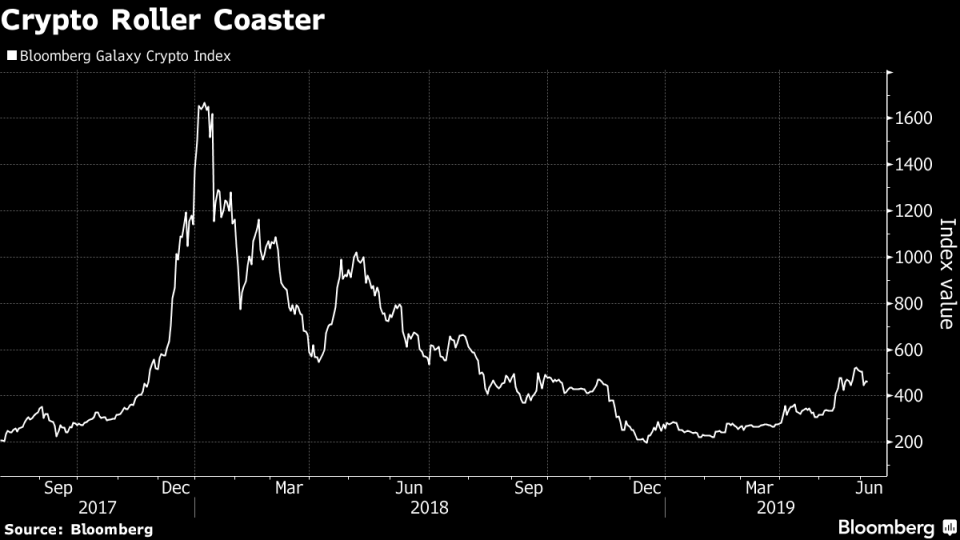Biggest Crypto Exchange Takes on Tether With Own Stablecoins
(Bloomberg) -- Beware, Tether. Some serious competition may finally be heading your way.
Binance, the world’s largest cryptocurrency exchange, will begin issuing so-called stablecoins “in a matter of weeks to a month or two," Chief Financial Officer Wei Zhou said in a phone interview. Traders use these lower-volatility coins to facilitate transactions and to park funds during wild swings in prices, and until now, Tether has been the undisputed market king.
While some 60 stablecoins have attempted to take on Tether, they haven’t gained much traction. Tether accounts for 98.7% of stablecoin trading volume, Paolo Ardoino, chief technology officer of rival crypto exchange Bitfinex, which has the same owners as Tether, said in an email. But Malta-based Binance’s dominance in the exchange business could make its foray into stablecoins more successful than those of others.
"A stablecoin issued by Binance would certainly threaten Tether’s value proposition," Kyle Samani, co-founder of Austin, Texas-based crypto hedge fund Multicoin Capital Management, said in an email.
The first low-volatility coin by the exchange, called Binance GBP, will be denominated in and 100% backed by the British pound, Zhou said from Amsterdam. Binance will disclose the bank it’s working with once the stablecoin, which is currently being tested, debuts, he said. The company will make money off of interest on fiat deposits, like Tether does, Zhou added.
Binance will introduce additional coins tied to other currencies, though it has no plans to introduce a U.S. dollar-backed stablecoin, Zhou said. It will also work with partners who will issue their own stablecoins on the Binance Chain ledger, which is a company-supported blockchain, he said. The startup Stably just issued a direct competitor to Tether, backed by U.S. dollars, over the distributed network.
The goal is to make stablecoins available for more of the world’s currencies, such as the euro and the yen, Zhou said.
"From the users’ perspective, only certain portions of the world use the dollar," Zhou said. "Other users use other currencies, and we feel it should be reflected in stablecoins as well."
The rival tokens could reduce Tether’s market share on Binance -- a critical market for the coin. Today, Tether represents more than 50% of stablecoin volume on the exchange, Zhou said. And Binance is one of the largest -- if not the largest -- holders of Tether globally, according to Tether’s Rich List.
The expansion comes while the companies behind Tether are in rough legal waters, and it’s recently emerged that Tether is only 74% -- instead of fully -- backed by cash and securities. Binance plans for its stablecoin to be 100% backed, and to offer more transparency, Zhou said. That could encourage traders to switch allegiance.
“Binance could also work with an auditor to offer strong assurances that the tokens are fully backed and easily redeemable," Samani said. "Considering the recent events with Tether, those assurances would be a compelling reason to use Binance’s stablecoin."
Binance is trying to drive more valuable tokens to its Binance Chain, a recently unveiled digital ledger that competes with the likes of Ethereum. It uses Binance’s own token called BNB to enable a variety of functions, and if supported stablecoins grow in use, that should boost BNB’s usage as well.
"This would positively impact BNB simply because it would likely lead to more volumes and ultimately more revenue for Binance, and in theory this would steal market share from USDT," as Tether is known, Jeff Dorman, chief investment officer at Arca. said in an email. "But Tether has proven to be quite resilient in the face of competition, and I’m not sure stealing market share is the goal -- growing the pie is the goal."
For now, Tether isn’t worried.
"As the crypto market matures, competition is welcomed to speed up the transition of stablecoins into a wider market," Ardoino said in the email.
(Updates chart. An earlier version corrected the location from where Wei Zhou spoke.)
To contact the reporter on this story: Olga Kharif in Portland at okharif@bloomberg.net
To contact the editors responsible for this story: Jeremy Herron at jherron8@bloomberg.net, Dave Liedtka, Randall Jensen
For more articles like this, please visit us at bloomberg.com
©2019 Bloomberg L.P.


